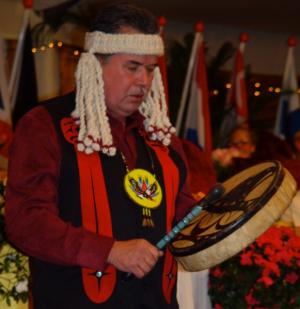Leaders of Native Indian tribes from around the US and Canada will gather on the campus of Maharishi University of Management in Fairfield, Iowa, for an international conference September 25-27 entitled “Building Healthy, Sustainable American Indian Communities.”
Conference speakers include Joe A. Garcia, president of the National Congress of American Indians; Robert Cook, president of the National Indian Education Association; Lucille Echohawk, strategic advisor for the Casey Family Programs; and Kevin Skenandore, acting director of the Bureau of Indian Education.
Conference hosts and participants include the Hocak Elders Council, Inc., the Indian Health Services (IHS), the National Congress of American Indians (NCAI), the National Indian Education Association (NIEA), the Bureau of Indian Affairs (BIE), Winnebago Tribal Health Services (WTHS), the Winnebago Treaty Hospital-IHS, and the David Lynch Foundation.
For more information see conference website and video on TM and Diabetes Among Native Americans: http://www.americanindiansustainableconference.org/
See Indian Country Today article, Sustainability quest: http://bit.ly/4vNhWo
Also News From Indian Country article, Indian Country leaders meet in Iowa to explore new approaches to sustainable communities: http://bit.ly/JUOM7
Canadian First Nations participants include STOLCEL [John Elliott], Tekahnawiiaks [Joyce King], and Tim Paul. STOCEL is a cultural and language custodian for his [Saanich] People and speaks extensively on culture and language and history; Tekahnawiiaks [Joyce King] is currently the Director of the Akwesasne Justice Department and is on the Mohawk Council of Akwesasne; and Tim Paul, is Executive Director of the Maliseet Nation Conservation Council of New Brunswick. http://mncc.ca/
STOLCEL will be receiving an honorary Ph.D. from M.U.M. for his lifelong work to revive the mother tongue of the Saanich People, his contribution as Co-Founder of FirstVoices, the world’s first web-based Aboriginal language archive, and for his discovery of the connection between the traditional language of his people and the underlying intelligence of Nature available in the sounds and structure of Veda, which he made in collaboration with M.U.M. founder Maharishi Mahesh Yogi. [See BACKGROUNDER on STOLCEL]
Tekahnawiiaks [Joyce King] will be speaking twice at the conference: on Education, and on Safeguarding Culture and Language. She lives on the Akwesasne Reserve near Cornwall, Ontario, along the border between Canada and NY State. Her bio is available online: <http://www.tekahnawiiaks.com/bio.html>.
Tim Paul will speak on his own experience with TM and the lowering of his blood sugar levels, as well as his keen interest in the “eco village” model at MUM, and the desire of the Maliseet Nation Conservation Council to incorporate many of the “sustainable technologies” demonstrated there, in his own Maliseet communities throughout New Brunswick.
The conference will showcase Consciousness-Based education, prevention-oriented health care, renewable energy, organic agriculture, and cultural preservation.
Researchers will also present the results of several controlled studies on the effects of the Transcendental Meditation® technique for reducing acute stress and behavioral problems among hundreds of at-risk American Indian youth at the Winnebago (Nebraska), Pine Ridge (South Dakota), and Passamaquoddy (Maine) reservations.
Findings to date show the Transcendental Meditation technique promoted higher scores on standardized state tests of mathematics and reading, 25% less absenteeism, a 20% drop in disciplinary incidents, and 30% higher graduation rates among the meditating young people compared to controls.
“The timing is perfect for this conference because the need is so great among the tribes,” said John Boncheff, who is co-director of the Transcendental Meditation program at the Winnebago reservation. “The Transcendental Meditation technique is not only helping students perform better in school, but it’s also helping both adults and children to overcome the terrible epidemic of diabetes, which strikes up to 80 percent of all American Indians.”
Dr. Boncheff said that it’s also helping American Indians reconnect with their spiritual heritage and traditional culture.
—————————–
BACKGROUNDER
STOLCEL [John Elliott]
(Photos available upon request)
STOCEL is a descendant of the hereditary family of Chiefs of the WSANEC [Saanich] People and lives on the Tsartlip Reserve near Victoria, Vancouver Island, British Columbia. He is the Co-Founder of ‘First Voices’, the world’s first web-based Aboriginal language archive. This web-based archive allows predominantly oral tradition languages of any aboriginal nations to be recorded, uploaded, saved, and learned in perpetuity by future generations online, rather than becoming obscure or obsolete when the Elders or fluent speakers pass away. As a result of his initial inspiration, there are now over 60 First Nations archiving their languages online, with 35 of those now publicly available for First Nations’ youth and non-mother tongue speakers to learn their languages: <http://www.firstvoices.com/>.
STOCEL is the Chair of the Subcommittee on Language for the First Nations Education Council for British Columbia, as well as the Chair of the Saanich Native Heritage Society, and is an active member on the Board of Governors of the First People’s Cultural Foundation. He has been teaching, developing curriculum, and preserving aboriginal languages for thirty years.
STOLCEL holds First Nations’ Language Certification from the British Columbia College of Teachers. He has taught in all grades and is now teaching Grades 7-10 in the SAANICH Tribal School as well as SENTOTEN for adults at the University of Victoria.
STOLCEL is being honored with of the degree of Doctor of Natural Law Honoris Causa by Maharishi University of Management for his work to bring out the connection of traditional language and the underlying field of Nature that upholds every culture in peace and progress.
In STOLCEL’s words: “There is never time enough time in the day for all the work that has to be done. Our languages are the key to ancient knowledge. Inside each language is the pattern of how to live in harmony with the earth and all the living things. More today, than ever, this knowledge is needed. Each time another language dies forever, our ancient connections to all life, our knowledge of the plants the animals, the trees and our mother earth is lost.”
Canadian Contact: Christopher Collrin, 506-471-5598, collrin@gmail.com
US Contact: Ken Chawkin, 641-470-1314, kchawkin@mum.edu
photo credit: STOLCEL of the WSANEC First Nation performs traditional recitation at international conference in Holland




